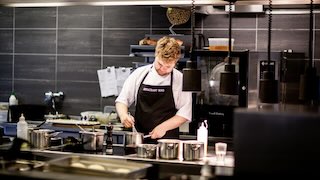FUKUOKA, Nov 14 (News On Japan) - November 11th marks “Sake Day,” a date chosen because the kanji for salmon (鮭) contains the characters for “eleven” side by side. Although Japan’s wild salmon catch has fallen due to rising sea temperatures and shifting ocean currents, the popularity of farmed salmon is growing rapidly across the country, including in Fukuoka.
At an elementary school in Munakata City, Fukuoka Prefecture, students enjoyed salmon for their school lunch on November 11th. The dish featured “Mirai Salmon,” a locally farmed species produced by Kyushu Electric Power Group, which began land-based aquaculture in 2023 to ensure a stable domestic supply. Using AI and other technologies to optimize rearing conditions, the company now ships around 100,000 salmon each year. The fillets, thinly sliced and added to miso soup, were well received by students, who praised their rich flavor and freshness.
According to the Ministry of Agriculture, Forestry and Fisheries, Japan’s wild salmon catch has dropped to less than a quarter of its level 20 years ago, largely due to weakened southward migration and prolonged periods of warmer seawater. In contrast, the number of regional aquaculture projects producing so-called “local salmon” has nearly tripled over the past decade, reaching 147 sites nationwide. These initiatives often highlight local specialties: in Tochigi Prefecture, farmers mix strawberries into feed, while in Ehime, mikan juice byproducts are used to create distinct regional flavors.
In Fukuoka, Mirai Salmon has also become popular among restaurants. One establishment in Kitakyushu’s Yahata Nishi Ward offers ten different dishes featuring the fish. “Its bright color and freshness make it perfect for raw dishes,” said the chef, noting that farmed salmon’s controlled environment minimizes the risk of parasites, making it ideal for sashimi. Customers have praised its tender texture, subtle sweetness, and lack of odor.
Land-based aquaculture is also inspiring a new generation of entrepreneurs. In Shingu Town, 18-year-old Kōki Fujiwara manages a salmon farming business he founded with his father. After visiting a salmon farm in Kumamoto at age 15, Fujiwara decided to pursue sustainable aquaculture and now raises about 2,000 salmon using a groundwater circulation system. “We don’t use antibiotics, instead adding yogurt to boost the fish’s immune system,” he explained. His company sells salmon mainly to restaurants for around 3,000 yen per kilogram, and he hopes to expand production to meet rising demand. “Supply hasn’t caught up with demand yet,” Fujiwara said. “I want to help make salmon more accessible to families and children everywhere.”
As Japan’s climate and seafood environment evolve, farmed salmon is emerging not just as a substitute for dwindling wild stocks but as a symbol of innovation in sustainable food production.
Source: FBS福岡放送ニュース















